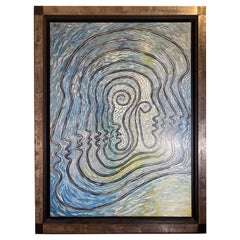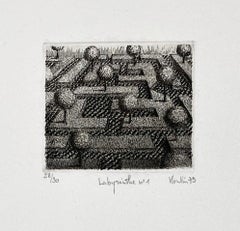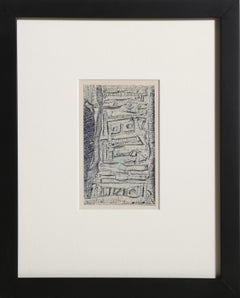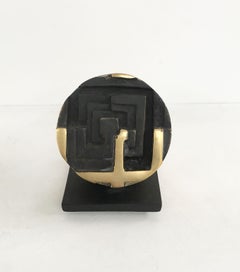Labyrinth Vintage
to
53
220
153
388
205
143
97
76
57
32
25
14
35
18
16
11
9
Sort By
Crimson Labyrinth
Located in San Francisco, CA
Artist: Suzanna Hart-Broughton – American (ca.1935-)
Title: Crimson Labyrinth
Year: 1983
Medium
Category
1980s Other Art Style Labyrinth Vintage
Materials
Canvas, Paper, Mixed Media, Oil, Acrylic
Night labyrinth, 1974
By Will Faber
Located in Barcelona, BARCELONA
The painting is being offered with a work and authenticity certificate
Category
1970s Abstract Labyrinth Vintage
Materials
Linocut
Painting Labyrinth, Alain Rothstein, 1984
Located in Saint ouen, FR
Painting Labyrinth - Alain Rothstein
Oil painting, water on canvas on frame
American box in
Category
1980s European Labyrinth Vintage
Materials
Other
Sonia Delaunay Labyrinth carpet Artcurial
By Sonia Delaunay
Located in Saint Ouen, FR
Sonia Delaunay
Tapis labyrinthe (1929)
Édition artcurial de 150 exemplaires
100% laine nouée main
Signé par initiales
1980
220 x 245 cms
12000 euros
Category
1980s Labyrinth Vintage
Materials
Wool
Labyrinth No. 1, by Francois Houtin
By François Houtin
Located in Palm Springs, CA
Signed, titled and numbered by the artist, edition of 30. This Imaginary topiary and garden scene is the smallest that Houtin completed. .
François Houtin was born in Craon en Maye...
Category
1970s Contemporary Labyrinth Vintage
Materials
Etching
Bronze sculpture Labyrinth by Fanna Roncoroni, 1970
Located in Ludwigslust, DE
. The work, "Labirinto," depicts a broken bronze sphere, the open side of which forms a labyrinth
Category
1970s Italian Brutalist Labyrinth Vintage
Materials
Bronze
Labyrinth, Conceptual Ink Drawing by Genichiro Inokuma
Located in Long Island City, NY
Genichiro Inokuma, Japanese (1902 - 1993) - Labyrinth, Year: 1970, Medium: Blue and Black Ink
Category
1970s Conceptual Labyrinth Vintage
Materials
Ink
Labyrinth 1987 Polish B1 Film Poster, Walkuski
Located in Bath, Somerset
The charming original Polish film poster for Jim Henson's Labyrinth featuring a lovely image of
Category
20th Century Polish Labyrinth Vintage
Materials
Paper
Abstract Sculpture by Fanna Roncoroni Labirinto Labyrinth
Located in Brescia, IT
of 1000 pieces numbered and signed by the author. The title is "Labirinto", translate in "Labyrinth
Category
Late 20th Century Post-Modern Labyrinth Vintage
Materials
Bronze
Labyrinth, Abstract Geometric Screenprint by Gisela Beker
By Gisela Beker
Located in Long Island City, NY
Artist: Gisela Beker, German/American (1932 - 2015)
Title: Labyrinth
Year: circa 1979
Medium
Category
1970s Abstract Geometric Labyrinth Vintage
Materials
Screen
Sculptural 'Labyrinth' Floor Lamp by Bronka Stern
By Bronka Stern
Located in Toronto, CA
Carved sculptural floor lamp by Polish-American sculptor Bronka Stern (1909-2002, one of the few women sculptors working in NYC in the 1960s.
Newly wired and fitted with a new coppe...
Category
1950s American Brutalist Labyrinth Vintage
Materials
Copper
Labyrinth 1986 Publicity Film Movie Press Still Framed
Located in Bath, Somerset
Original 8x10 inches Publicity Film Still for Labyrinth (1986) starring David Bowie and Jennifer
Category
20th Century American Labyrinth Vintage
Materials
Paper
Labyrinth 1986 Publicity Film Movie Press Still Framed
Located in Bath, Somerset
Original 8x10 inches Publicity Film Still for Labyrinth (1986) starring David Bowie and Jennifer
Category
20th Century American Labyrinth Vintage
Materials
Paper
Labyrinth 1986 Publicity Film Movie Press Still Framed
Located in Bath, Somerset
Original 8x10 inches Publicity Film Still for Labyrinth (1986) starring David Bowie and Jennifer
Category
20th Century American Labyrinth Vintage
Materials
Paper
Labyrinth 1986 Publicity Film Movie Press Still Framed
Located in Bath, Somerset
Original 8x10 inches Publicity Film Still for Labyrinth (1986) starring David Bowie and Jennifer
Category
20th Century American Labyrinth Vintage
Materials
Paper
Labyrinth 1986 Publicity Film Movie Press Still Framed
Located in Bath, Somerset
Original 8x10 inches Publicity Film Still for Labyrinth (1986) starring David Bowie and Jennifer
Category
20th Century American Labyrinth Vintage
Materials
Paper
Labyrinth 1986 Publicity Film Movie Press Still Framed
Located in Bath, Somerset
Original 8x10 inches Publicity Film Still for Labyrinth (1986) starring David Bowie and Jennifer
Category
20th Century American Labyrinth Vintage
Materials
Paper
Labyrinth 1986 Publicity Film Movie Press Still Framed
Located in Bath, Somerset
Original 8x10 inches Publicity Film Still for Labyrinth (1986) starring David Bowie and Jennifer
Category
20th Century American Labyrinth Vintage
Materials
Paper
Labyrinth 1986 Publicity Film Movie Press Still Framed
Located in Bath, Somerset
Original 8x10 inches Publicity Film Still for Labyrinth (1986) starring David Bowie and Jennifer
Category
20th Century American Labyrinth Vintage
Materials
Paper
Labyrinth 1986 Publicity Film Movie Press Still Framed
Located in Bath, Somerset
Original 8x10 inches Publicity Film Still for Labyrinth (1986) starring David Bowie and Jennifer
Category
20th Century American Labyrinth Vintage
Materials
Paper
Labyrinth 1986 Publicity Film Movie Press Still Framed
Located in Bath, Somerset
Original 8x10 inches Publicity Film Still for Labyrinth (1986) starring David Bowie and Jennifer
Category
20th Century American Labyrinth Vintage
Materials
Paper
Labyrinth 1986 Publicity Film Movie Press Still Framed
Located in Bath, Somerset
Original 8x10 inches Publicity Film Still for Labyrinth (1986) starring David Bowie and Jennifer
Category
20th Century American Labyrinth Vintage
Materials
Paper
Labyrinth 1986 Publicity Film Movie Press Still Framed
Located in Bath, Somerset
Original 8x10 inches Publicity Film Still for Labyrinth (1986) starring David Bowie and Jennifer
Category
20th Century American Labyrinth Vintage
Materials
Paper
Labyrinth 1986 Publicity Film Movie Press Still Framed
Located in Bath, Somerset
Original 8x10 inches Publicity Film Still for Labyrinth (1986) starring David Bowie and Jennifer
Category
20th Century American Labyrinth Vintage
Materials
Paper
Andre Masson, The Labyrinth, from XXe Siecle, 1969
By André Masson
Located in Southampton, NY
This exquisite lithograph by Andre Masson (1896–1987), titled Le Labyrinthe (The Labyrinth), from
Category
1960s Surrealist Labyrinth Vintage
Materials
Lithograph
$716 Sale Price
20% Off
Ilias Lalaounis 18k Hammered Gold Labyrinth Collar Necklace
By Ilias Lalaounis
Located in Austin, TX
A simple and elegant "Labyrinth" collar necklace by Ilias Lalaounis in bright 18k hammered yellow
Category
1990s Greek Hellenistic Labyrinth Vintage
Materials
Gold, 18k Gold, Yellow Gold
Rare Labyrinth Cigarette Box by Lalaounis, Brass and Silver, 1970s
Located in Firenze, IT
labyrinth kind of image. Throughout the world there exists a symbol - a series of concentric lines
Category
1970s Greek Retro Labyrinth Vintage
Materials
Silver, Brass
Woman in Labyrinth - Lithograph by Nani Tedeschi - 1971
By Nani Tedeschi
Located in Roma, IT
Hand Signed. Edition of 99 pieces, plus 20 pieces in roman numbers.
Category
1970s Contemporary Labyrinth Vintage
Materials
Lithograph
Woman in Labyrinth - Original Lithograph by Nani Tedeschi - 1971
By Nani Tedeschi
Located in Roma, IT
Woman in Labyrinth is an original artwork realized by Nani Tedeschi.
Hand Signed on the lower
Category
1970s Abstract Labyrinth Vintage
Materials
Lithograph
Woman in Labyrinth - Original Lithograph by Nani Tedeschi - 1971
By Nani Tedeschi
Located in Roma, IT
Woman in Labyrinth is an original artwork realized by Nani Tedeschi.
Hand Signed on the lower
Category
1970s Contemporary Labyrinth Vintage
Materials
Lithograph
David Yurman Labyrinth Sterling Silver 1.00 Ct. Pave Diamond Ring
By David Yurman
Located in New York, NY
David Yurman ring from the Labyrinth collection finely crafted in sterling silver featuring round
Category
Late 20th Century American Contemporary Labyrinth Vintage
Materials
Diamond, Sterling Silver
$935 Sale Price
37% Off
Robert Morris: Labyrinths--Voice--Blind Time (The Castelli-Sonnabend Poster)
By Robert Morris
Located in New York, NY
Robert Morris
Robert Morris: Labyrinths--Voice--Blind Time (The Castelli-Sonnabend Poster), 1974
Category
1970s Pop Art Labyrinth Vintage
Materials
Offset, Lithograph
1978 Italy Bronze Abstract Sculpture by Fanna Roncoroni Labirinto Labyrinth
Located in Brescia, IT
of 1000 pieces numbered and signed by the author. The title is "Labirinto", translate in "Labyrinth
Category
Late 20th Century Italian Post-Modern Labyrinth Vintage
Materials
Bronze
Woman in Labyrinth - Original Lithograph by Nani Tedeschi - 1971
By Nani Tedeschi
Located in Roma, IT
Hand Signed. Edition of 99 pieces, plus 20 pieces in roman numbers.
Very good condition.
Category
1970s Contemporary Labyrinth Vintage
Materials
Lithograph
'Labyrinth' Danish Candle Holder by Lene Munthe for Georg Jensen
Located in Asbury Park, NJ
'Labyrinth' lightweight aluminium candle holder by Lene Munthe for Georg Jensen with a sensuous
Category
Late 20th Century Danish Scandinavian Modern Labyrinth Vintage
Lapponia Brooch Labyrinth Björn Weckström Finland Modernist Man From Mercury
By Björn Weckström for Lapponia
Located in New York, NY
vintage modernist sculptural sterling silver “Labyrinth” brooch, 1987.
This is a superb museum quality
Category
Mid-20th Century Finnish Modern Labyrinth Vintage
Materials
Sterling Silver
Inmate Work Project: Perpetual Construction and Dismantling of the Labyrinth
By Robert Morris
Located in Long Island City, NY
Dismantling of the Labyrinth from In the Realm of the Carceral
Year: 1978
Medium: Etching with Aquatint
Category
1970s Conceptual Labyrinth Vintage
Materials
Etching, Aquatint
Toso Mid-Century Modern Crystal Murano Glass Chandelier Labyrinth, 1995s
By Toso Vetri D'arte
Located in Murano, Venezia
Murano blown glass Labyrinth chandelier with 16 crystal elements, with "Ice" processing
Its black
Category
1990s Italian Mid-Century Modern Labyrinth Vintage
Materials
Murano Glass
David Yurman Sterling Silver and Diamond Labyrinth Single Loop Bracelet #23113
By David Yurman
Located in Washington Depot, CT
David Yurman Sterling Silver and Diamond Labyrinth Single Loop Bracelet-
This elegant piece
Category
20th Century Contemporary Labyrinth Vintage
Materials
Diamond, Sterling Silver
Pierre Alechinsky(1927) -Plate II from the portfolio Ceremonial Labyrinths- 1972
By Pierre Alechinsky
Located in Varese, IT
Color lithograph on Arches paper, edited in 1972
Limited edition of 100 copies, numbered 67/100 in lower left corner.
Signed in pencil by artist in lower right corner.
Paper size: 7...
Category
1970s Abstract Labyrinth Vintage
Materials
Lithograph
Labyrinth of dreams - XX Century, Figurative Etching Print, Landscape, Animal
By Barbara Rosiak
Located in Warsaw, PL
Barbara Rosiak is a Polish painter and graphic designer born in 1955 in Lodz. From 1974 to 1979, she studied at the National Superior School of Fine Arts at the Faculty of Painting a...
Category
20th Century Other Art Style Labyrinth Vintage
Materials
Paper, Etching
Iconic bag by Pierre Balmain with Labyrinth monogram - Paris Circa 1971-1975
By Pierre Balmain
Located in Toulon, FR
Circa 1971-1975 France
Famous shoulder bag or handbag with the Labyrinth monogram designed by
Category
1970s French Labyrinth Vintage
Seattle School, Mid-Century Abstract Oil on Canvas Panel "Labyrinth" circa 1960
Located in Atlanta, GA
**Seattle School, Mid-Century Abstract Oil Painting on Canvas Panel, Titled "Labyrinth," circa
Category
Mid-20th Century American Labyrinth Vintage
Materials
Canvas, Paint
$960 Sale Price
20% Off
Toso Mid-Century Modern Crystal Murano Glass Chandelier Labyrinth Italian, 1995s
By Toso Vetri D'arte
Located in Murano, Venezia
Murano blown glass Labyrinth chandelier with 16 crystal elements, with "Ice" processing
Its black
Category
1990s Italian Mid-Century Modern Labyrinth Vintage
Materials
Blown Glass, Murano Glass
Glastonbury, Labyrinth, Peat - Original Etching on Paper by Joe Tilson - 1976
By Joe Tilson
Located in Roma, IT
Glastonbury, Labyrinth, Peat is a black and white etching on rosaspina Fabriano watermarked paper
Category
1970s Contemporary Labyrinth Vintage
Materials
Etching
Delphic Oracle collage by Joe Tilson with Greek writing and mythology
By Joe Tilson
Located in New York, NY
regarding the Oracle of Delphi in multicolor with a labyrinth design. The Delphic Oracle was the most
Category
1980s Contemporary Labyrinth Vintage
Materials
Screen
Luciano Frigerio bed 1970s
Located in bari, IT
square spiral or labyrinth pattern.
The metal surface is not smooth but has an irregular, “hammered
Category
1970s Italian Mid-Century Modern Labyrinth Vintage
Materials
Brass
Doris Leslie Blau Vintage Yellow Swedish Half Pile by Elsa Gullberg
Located in New York, NY
, the rug features a subtle geometric labyrinth pattern formed through a masterful interplay of cut and
Category
Mid-20th Century Swedish Mid-Century Modern Labyrinth Vintage
Materials
Wool
Delphic Oracle collage by Joe Tilson with Greek writing and mythology
By Joe Tilson
Located in New York, NY
regarding the Oracle of Delphi in multicolor with a labyrinth design. The Delphic Oracle was the most
Category
1980s Contemporary Labyrinth Vintage
Materials
Screen
Great America, French Book by PML Editions, 1988
By Modern History
Located in Atlanta, GA
dazzling winter mornings of the Midwest, the labyrinth of the swamps of the Florida Everglades, or even a
Category
1980s French Modern Labyrinth Vintage
Materials
Paper
1965 Handmade Vintage Art Studio Pottery Bowl Sculpture, Argentina
Located in North Miami, FL
Handmade fired clay decorative bowl with central eye motif and labyrinth pattern throughout. The
Category
1960s Argentine Tribal Labyrinth Vintage
Materials
Earthenware
Marino Marini (1901-1980) - MARINO FROM GOETHE - Color etching and aquatint
By Marino Marini
Located in Varese, IT
64 cm
Ed: ZWR, London
P: Labyrinth, Florence
on the back, declaration of authenticity by Mrs. Marini
Category
1970s Abstract Labyrinth Vintage
Materials
Etching, Aquatint
Marino Marini (1901-1980) - MARINO FROM GOETHE IV - Color etching and aquatint
By Marino Marini
Located in Varese, IT
63 cm
Ed: ZWR, London
P: Labyrinth, Florence
on the back, declaration of authenticity by Mrs. Marini
Category
1970s Abstract Labyrinth Vintage
Materials
Etching, Aquatint
Portrait of Jorge Luis Borges - Vintage Photograph - 1960s
Located in Roma, IT
metaphysical themes. He often dealt with concepts like labyrinths, mirrors, time, and infinity
Category
1960s Modern Labyrinth Vintage
Materials
Photographic Paper
Labyrinthe by Herman Kern German Language 1st Edition 1983 Hardcover Book
Located in Moreno Valley, CA
Herman Kern. labyrinths. Manifestations and interpretations, 5000 years presence of an archetype.Through
Category
Late 20th Century German Baroque Labyrinth Vintage
Materials
Paper
Australian Aboriginal Fairy Tale in Jungle Scene Fantasy like Paul Gauguin
Located in Miami, FL
and aesthetic skills by designing a labyrinth trees in organic patterns of light and shadow making it
Category
1960s Surrealist Labyrinth Vintage
Materials
Tempera, Watercolor, Illustration Board, Pencil
Icarus. 1981. Oil on canvas, 100x150 cm
By Ivars Muizulis
Located in Riga, LV
labyrinth of Crete. After Theseus, king of Athens and enemy of Minos, escaped from the labyrinth, King Minos
Category
1980s Abstract Expressionist Labyrinth Vintage
Materials
Canvas, Oil
$4,168 Sale Price
20% Off
- 1
Get Updated with New Arrivals
Save "Labyrinth Vintage", and we’ll notify you when there are new listings in this category.
Labyrinth Vintage For Sale on 1stDibs
Surely you’ll find the exact labyrinth vintage you’re seeking on 1stDibs — we’ve got a vast assortment for sale. Frequently made of silver, sterling silver and gold, this item was constructed with great care. For this particular accessory, there are many different carat weights to choose from, but versions are of considerable interest. Finding an appealing labyrinth vintage — no matter the origin — is easy, but Ilias Lalaounis, David Yurman and Björn Weckström for Lapponia each produced a popular version that is worth a look. A labyrinth vintage of any era or style can lend versatility to your look, but a version featuring diamond, from our inventory of 6, is particularly popular. Today, if you’re looking for a round cut version of this piece and are unable to find the perfect match, our selection also includes uncut alternatives. If you’re browsing our inventory for a labyrinth vintage, you’ll find that many are available today for women, but there are still pieces to choose from for unisex and men.
How Much is a Labyrinth Vintage?
The price for a labyrinth vintage starts at $325 and tops out at $28,500 with these necklaces, on average, selling for $1,300.
More Ways To Browse
Vintage Western
Western Bar
Modernist Jewellery
Hermes France
Vintage Modernist Jewelry
Argentina Furniture
Used Western Furniture
First Edition Books
Curved Furniture
Knoll Vintage Furniture
Indonesian Wood
Crystal Chandeliers Made In Italy
Hermes Jewellery
Used Hermes Jewelry
Indonesian Carved
Used Furniture In Belgium
Vintage Swiss Watch
Midcentury Modern Abstract Wood







